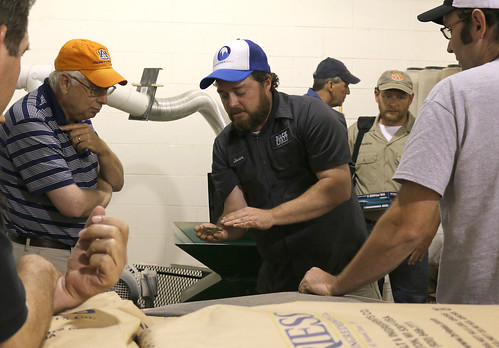Auburn and Extension researchers: Craft breweries seeking Alabama-grown grain
Article body
Small towns across the country are growing hubs for craft brewers selling what some are calling “liquid art.” Auburn University and Alabama Cooperative Extension System researchers are partnering with farmers to provide craft brewers with the essentials for making an excellent brew, and barreling toward an online brewery program.
Alabama Extension Plant Pathologist Austin Hagan and his colleagues are collaborating with counterparts at other land-grant universities to provide sound information to farmers looking to grow hops and barley for brewing.
“Barley is a high maintenance crop,” Hagan said. “It will take intensive management to see high yields, but brewing barley prices may be worth it to the producer.”
Economics of growing barley for brewing
Preston Prewett, a broker for barley growers and buyers with Old South Malt House, said while feed barley is sold between $3 and $4 per bushel, barley for brewing is sold for as little as $9 per bushel and as much as $22 per bushel.
Unlike wheat and oats, barley requires more inputs and strategic management. Barley is susceptible to many pests and diseases that also affect wheat, oats and rye. Normal management practices for grain crops will be necessary, as well as additional pesticide or insecticide applications as needed.
Input levels may be higher for barley, but the end result of a healthy crop and good yield may mean the difference in good prices and great prices.
“Trials conducted throughout the state, in addition to information from states with more experience growing barley for brewing will allow producers to set realistic expectations for their barley crops,” Hagan said.
Hops in Alabama
The majority of hops are produced in the Pacific Northwest, but Kassie Conner, a plant pathologist with the Alabama Cooperative Extension System, said hops can be grown in Alabama.
In 2009, there were only four states that grew hops. The most recent studies show Alabama ranking 24th in states growing hops for commercial use.
“Hops will grow in Alabama,” Conner said. “Hops are long-lived perennials [10-15 years] that need long photo periods to produce cones.”
Commercial hops plants are female plants. Aromatic and bittering qualities added to the brewing process make hop varieties desirable for different types of beer. Conner found the Cascade, Centennial, Chinook, Nugget and Columbus varieties grow well in the state. The Cascade variety has shown favorable growth in warmer climates.
Auburn University Brewing Science Program
While Alabama farmers are considering hops and barley for brewing, Julie Howe, associate professor in the Auburn University Department of Crop, Soil and Environmental Sciences, is partnering with university and industry partners to develop an online program for individuals seeking a graduate certification in brewing science.
Howe said there is widespread demand for certification, and Auburn University is working to fulfill that need. The program is designed for online completion, but the practicum can be completed where students are located.
“There is a growing interest in craft brewing,” Howe said. “If Alabama farmers consider niche varieties, not at the forefront of the market, there is a strong possibility of finding interested buyers.”
Going forward, the goal is to develop a bachelor’s and master’s program that will work closely with breweries in the state and allow candidates for the degrees an opportunity for hands-on experience while completing the certification in brewing science and operations.
For more information, visit the Alabama Cooperative Extension System website at www.aces.edu or contact a local Extension agent at www.aces.edu/directory.
Related Media
Media interested in this story can contact Communications Director Preston Sparks at (334) 844-9999 or preston.sparks@auburn.edu.
Auburn University is a nationally ranked land grant institution recognized for its commitment to world-class scholarship, interdisciplinary research with an elite, top-tier Carnegie R1 classification, life-changing outreach with Carnegie’s Community Engagement designation and an undergraduate education experience second to none. Auburn is home to more than 30,000 students, and its faculty and research partners collaborate to develop and deliver meaningful scholarship, science and technology-based advancements that meet pressing regional, national and global needs. Auburn’s commitment to active student engagement, professional success and public/private partnership drives a growing reputation for outreach and extension that delivers broad economic, health and societal impact.





